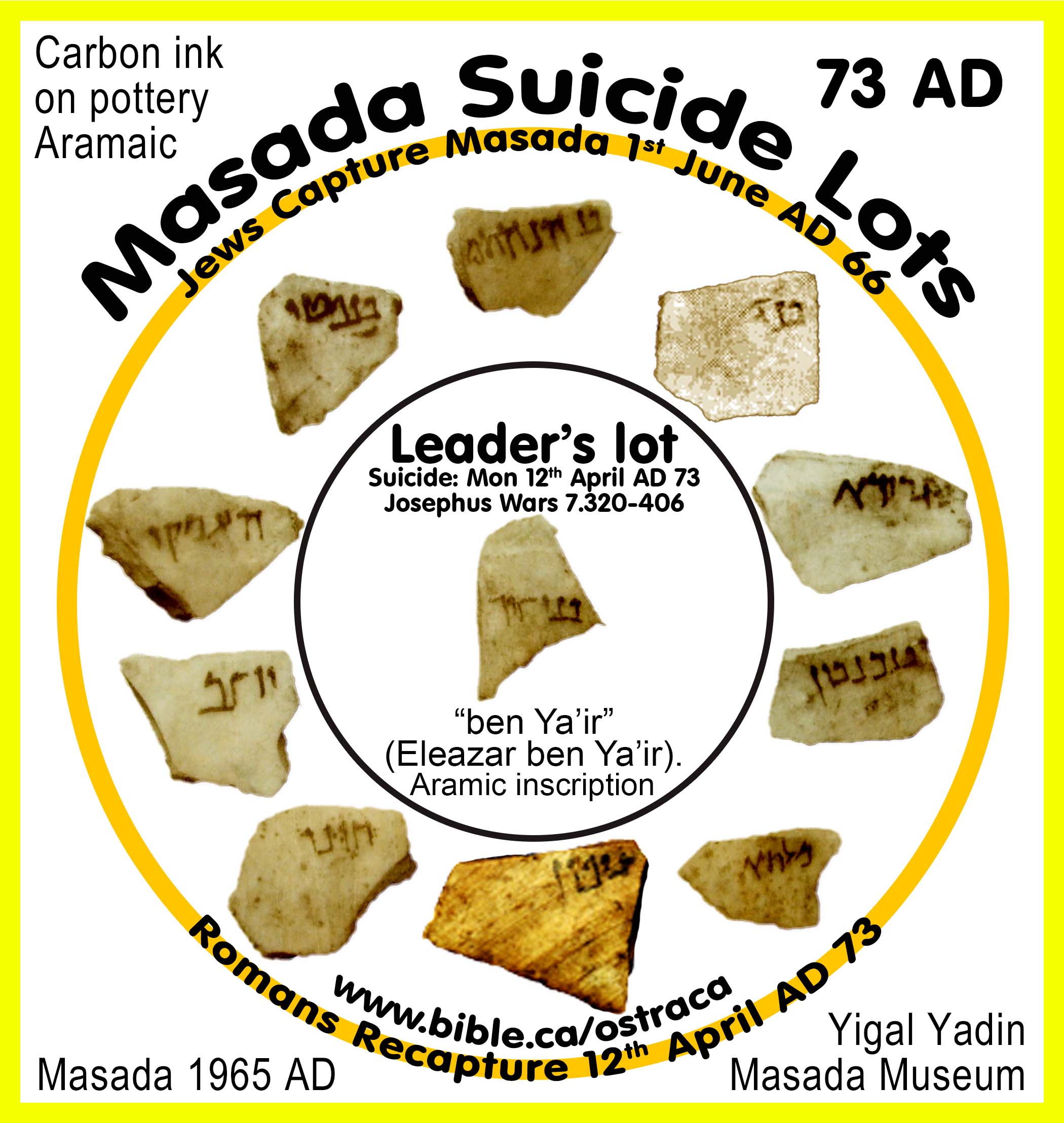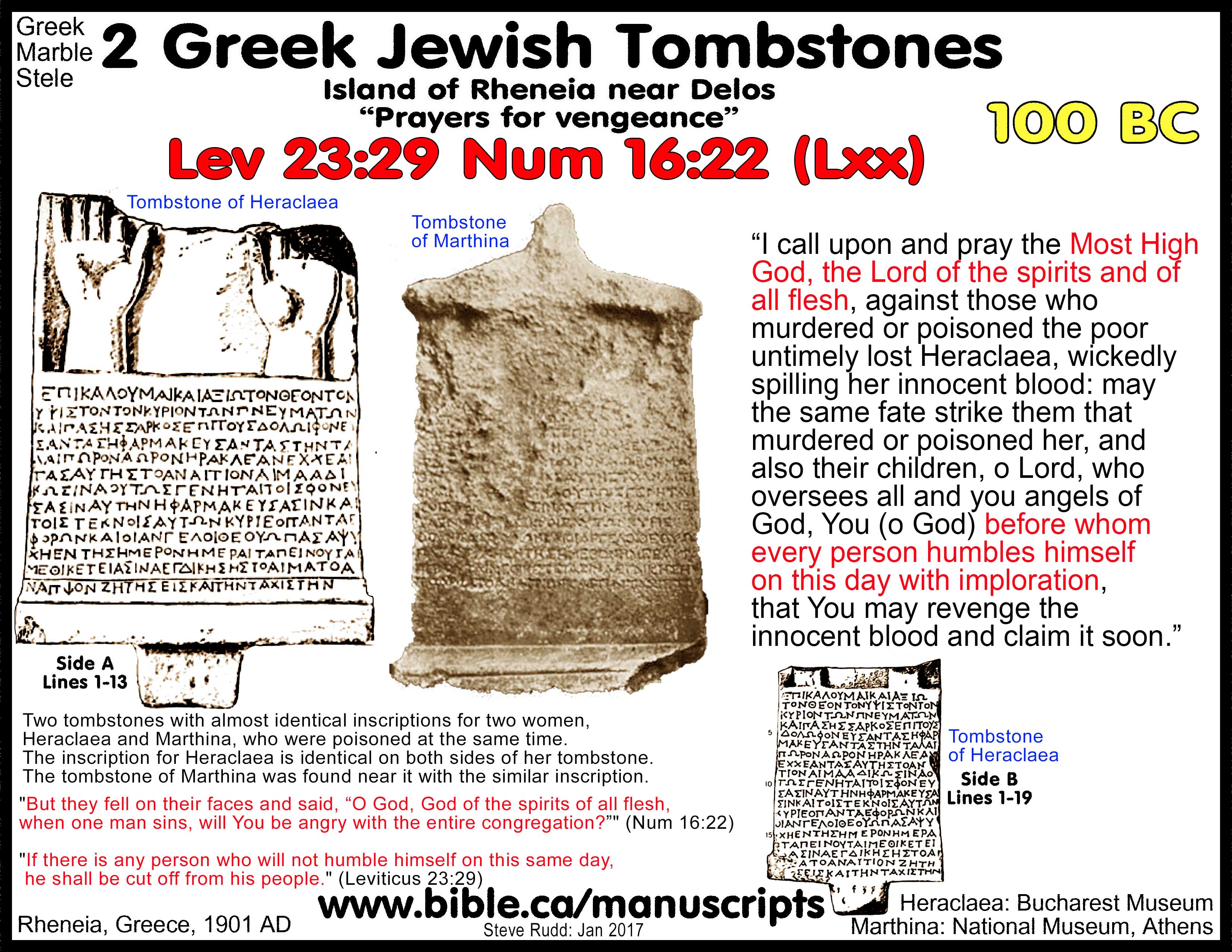Two tombstones of two murdered/poisoned Jewish women: 100 BC
A Greek Funerary Prayer of vengeance for Heraclaea and Marthina
Discovered on Rheneia Island near Delos Greece
Introduction:
1. Hebrew as a language was extinct at the time of Jesus both inside Judea and the Diaspora Jews living outside the promised land.
|
Geographic area |
Language of commerce |
Default daily use language |
|
Inside Judea |
Greek |
Aramaic |
|
Outside Judea |
Greek |
Greek |
a. Aramaic was the default language as seen in Jesus’ cry in Aramaic: “My God, why have you forgotten me” on the cross.
b.
Aramaic was the default language of the first century
Jews as seen in the Aramaic Lots found at Masada.

2. In 1901 AD, two tombstones were published that were discovered at the same time and place on the island of Rheneia which is near the Island of Delos in Greece.
a. The inscriptions were dated to 100 BC and determined to be of Jewish origin from a colony living on the Island.
- "Two Jewish inscriptions from the island of Rheneia near Delos from c. 100 bce imply the use of the LXX outside Egypt also. The Alexandrian translation of the Pentateuch marched victoriously throughout the whole Greek-speaking Jewish Diaspora." (The Septuagint as Christian scripture: its prehistory and the problem of its canon, M. Hengel, R. Deines, M. E Biddle, p76, 2002 AD)
3. The two Jewish women named Heraclaea and Marthina were murdered by poisoning at the same time.
a. Nothing is known about who these women are although suggestions have been made they were wives or daughters of the synagogue official on the Island of nearby Delos.
b. The tombstone inscription is an angry commentary from the relatives.
4. The wording of the inscription follows the unique wording in the Septuagint in several places, especially Num 16:22 and Lev 23:29
a. "But they fell on their faces and said, “O God, God of the spirits of all flesh, when one man sins, will You be angry with the entire congregation?”" (Num 16:22)
b. "“If there is any person who will not humble himself on this same day, he shall be cut off from his people." (Leviticus 23:29)
c. The Lev 23:29 text is part of the day of atonement and the use of these words on the tombstone show.
I. The tombstone inscription:
1. Two tombstones with almost identical inscriptions for two women, Heraclaea and Marthina, who were poisoned at the same time.
a. The inscription for Heraclaea is identical on both sides of her tombstone.
b. The tombstone of Marthina was found near it with the similar inscription to the one found on the funerary marker of Heraclaea.
2. Here is the translation of the Greek inscription:
- “I call upon and pray the Most High God, the Lord of the spirits and of all flesh, against those who with guile murdered or poisoned the wretched, untimely lost Heraclea, shedding her innocent blood wickedly: that it may be so with them that murdered or poisoned her, and with their children; O Lord that seeth all things, and ye angels of God, Thou before whom every soul is afflicted this same day with supplication: that Thou mayst avenge the innocent blood and require it again right speedily!” (Light from the ancient East the New Testament illustrated by recently discovered texts of the Graeco-Roman world, A. Deissmann, & L. R. M. Strachan, p434, 1910 AD)
- “I call upon and pray the Most High God, the Lord of the spirits and of all flesh, against those who murdered or poisoned the poor untimely lost Heraclaea, wickedly spilling her innocent blood: may the same fate strike them that murdered or poisoned her, and also their children, o Lord, who oversees all and you angels of God, You (o God) before whom every person humbles himself on this day with imploration, that You may revenge the innocent blood and claim it soon.” (The New Testament Milieu, A.B. Du Toit, 1998 AD)
- Notice the following parallels:
|
Tombstone inscription |
Septuagint LXX |
|
the Most High God, the Lord of the spirits and of all flesh, against those who murdered |
“O God, God of the spirits of all flesh, when one man sins, will You be angry” (Num 16:22) |
|
every person humbles himself on this day with imploration, that You may revenge the innocent blood |
"If there is any person who will not humble himself on this same day, he shall be cut off from his people." (Leviticus 23:29) |
II. Details of the two funerary inscriptions:
- “Both the vocabulary and the phraseology echo the Greek translation of the Hebrew Bible known as the Septuagint. For example, “the day on which every soul humiliates itself with supplications” is strongly reminiscent of Leviticus 23:29, “Every soul that shall not humiliate itself on that day shall be cut off from its people,” which is a reference to fasting on the Day of Atonement.” (Jewish Funerary Inscriptions—Most Are in Greek, BAR, Pieter W. van der Horst, 1992 AD)
- “Originally, this tombstone from the first century B.C. was accompanied by a twin stone. Together they are the silent witnesses of the death of two beloved daughters (or wives?), Heraclaea and Marthina, who were murdered at the same time. They are a moving testimony of the mourning of those who remained behind in the Jewish community of Delos. Note the typical appellation ‘Almighty God’ (cf. §1475). The day on which every person must “humble himself with imploration” is probably the Day of Atonement. This indicates that the Jews in the Diaspora also celebrated this feast (cf. §1186). In contrast to the heathen incantational practices which were meant to operate in a magical way (cf. §669–70), the hands here are stretched out pleadingly to God to revenge the death of these two innocent people. To the bereaved the murderers may be unknown, but not for God, who ‘oversees all’.” (The New Testament Milieu, A.B. Du Toit, 1998 AD)
- “Jewish inscriptions of the pre-Christian period are very rare, and merely on that account every increase of material is of interest. But even in details the texts yield a respectable harvest. They afford confirmatory proofs of the existence of a Jewish community at Delos in the time of the successors of Alexander; they moreover render it probable that the Jews of Delos also buried their dead at Rheneia. That must have been in compulsory conformity with the customs of the place. But the name Heraclea the ending of the name Marthina, the shape of the gravestones, the symbol of the two hands on the stones, and notably the whole style of the prayer—these are all adaptations to the Hellenic surroundings. Hellenism is already at work on the great task of peacefully secularising the Jewish faith, and this at a time when in the old home of that faith men were still living who had witnessed the great days when the Maccabean martyrs poured out their blood for the law of their fathers. This Hellenisation from outside was assisted from another direction by the Hellenisation of the Bible which originated with the cosmopolitan Jews of Alexandria. The Septuagint was already in use among the Jews of the Diaspora when the inscriptions at Rheneia were composed. This is a very important fact. Our inscriptions add to the literary evidence of the existence and use of the Septuagint in early times an original document that is only a few decades later than the celebrated testimony of the prologue to Ecclesiasticus. In this respect they are more valuable than the tablet of Hadrumetum. They show further that the great Day of Atonement was actually celebrated by the Jews of Delos in the period about 100 B.C. We are not particularly well informed about worship in the Diaspora, and we therefore welcome the evidence that our stones give as to the celebration of the Feast of Feasts one hundred and fifty years before the time when the apostle Paul sailed in an Alexandrian ship on Cretan waters, shortly after the Fast (i.e. the Day of Atonement). Finally the inscriptions from Rheneia afford us a glimpse of the inner life of the Jewish community at Delos. Two girls. Heraclea and Marthina, have been murdered; the murderers, to whose guile or magic the poor things have fallen victims. are unknown. The blood of the innocent cries aloud to Heaven, for it is written, “Whoso sheddeth man’s blood, by man shall his blood be shed.” So vengeance is left to Him who visits the sins of the fathers upon the children. On the most solemn festival of the year, when all Israel afflict themselves and the prayers of the scattered children of Abraham rise everywhere on the four winds of heaven to the throne of the Eternal, whilst at Jerusalem the high priest enters the “Holy of Holies,”—the mourners bring their grim petition before God; in fervent prayer on the Day of Atonement they consign the murderers to the vengeance of the Omniscient and His angels.” (Light from the ancient East the New Testament illustrated by recently discovered texts of the Graeco-Roman world, A. Deissmann, & L. R. M. Strachan, p434, 1910 AD)
Conclusion:
1. These two funerary grave markers continue to cry out today against the person who poisoned these two Jewish women living on the Island of Rheneia, Greece.
2. Since the time of Alexander the Great (333 BC), the Greek language was the working and default language of all the Jews living outside the promised land of Judah.
3. These grave markers in Greek, are confirmation of this fact.
4. The Greek Septuagint Old Testament (Tanakh) was the scripture text found in every synagogue, not only outside Israel, but also in Judea as well at the time of Christ.
a. Hebrew, as a language had gone extinct among the Jews everywhere except for the Jerusalem Temple elites.
b. Outside Judea, Greek was the default working language
c. Inside Judea, Greek was the working language of commerce but Aramaic was the default language as seen in Jesus’ cry “My God, why have you forgotten me” on the cross.
By Steve Rudd: Contact the author for comments, input or corrections.

